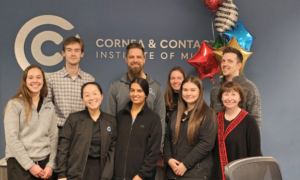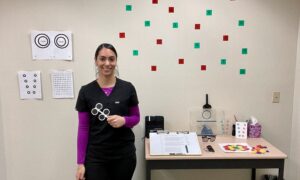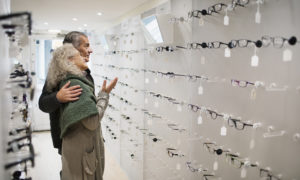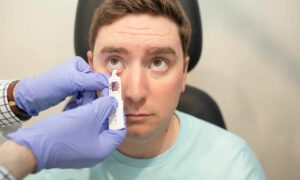By Dave Anderson, OD

Jan. 9, 2019
Delegation can be frightening because, after thorough training, you have to take a leap of faith, and let competent, well-prepared employees do tasks you used to do yourself. The rewards of effectively delegating, though, make taking this leap of faith well worth it.
You gain additional time with your patients in the exam room, time to see more patients per day, or more time for yourself and your family.
From a revenue-generation standpoint, having 10 minutes a day lead to an additional exam slot available for patient care, which lead to a significant increase in revenue, over $2,000 additional per month.
I delegate as many functions as possible to my staff, so I can focus on being a doctor. I feel our role with patients is providing a good plan based on their vision and eye-health needs, not gathering testing information. I delegate all pre-testing, visual acuities, history taking, specialty testing, contact lens fits and some follow-up care, contact lens ordering, glasses fitting and adjusting, exam-note taking, and medical prescription refills and prior authorization requests.
Editors’ Note: Not all states permit all of these actions to be delegated to a non-doctor in optometrists’ offices.

Group shot of Dr. Anderson and his staff. He says that delegating to these employees improves the patient experience, and makes the practice more efficient and profitable.
Each of these tasks requires a skill that can be learned in a short amount of time, as long as the employee is capable of paying attention to detail. There is very little doctor knowledge required to do these tasks, and delegating properly allows us to see more patients and be more effective when we are with our patients.
Identify Tasks You May Not Have to Do Yourself
In the past, I would always place the orders for specialty contacts myself, and this, on average, would take about 10 minutes at least two times a week. I would also check acuities for contact lens follow-ups and emergency problems. Seeing about six emergency visits and medical follow-ups, and another three contact lens follow-ups per day, it felt like I spent an hour testing visual acuities.
I always spent significant time on exam notes at the end of the day, typically writing letters or completing the notes on a plan, amounting to at least 30 minutes nearly every day that now is done before the patient leaves the exam lane since I have a scribe. I also would spend over an hour a week dealing with medication refill and prior authorization requests, and that now is done by my staff. Each of these tasks requires staff training to delegate, but frees me up to be a doctor and perform the tasks that only I can perform for my patients.
Other Articles to Explore
Adjust Work Flow to Accommodate Delegation
The work flow changed immediately when we increased the use of pre-testers for visual acuity and history for both comprehensive exams and emergency visits. We hired a new staff member to help with this, as we went from 30-40 pre-test visits to over 60 per day.
However, we also use that staff member to work on pulling insurance for the upcoming exams, send out recall notices and handle any scanning of old records or letters from other doctors that is required. We spend a lot of time on training, and work on this on a quarterly basis for each area that is delegated. There is always a checklist for the tasks that are performed, such as a pre-testing checklist to ensure all pre-tests are done for each patient.
We provide the checklists for each delegated area, but we also provide constant feedback to those performing the duties and re-train each quarter to ensure everyone is doing the task in the same way for every patient.
Training Never Ends
We provide constant training, and make sure all tasks are being done correctly, and that the experience for the patient is the same as it was when I was performing the task. Other things that we do is periodic audits of staff performance, done either by myself or my office manager. We continue to look at the process to ensure it is consistent with the experience we want for our patient, and we ask specific feedback questions related to our delegation on patient surveys to ensure the experience is ideal for patients.
For example, on our patient survey that is sent directly to patients’ phone after the exam, one of the questions we ask is, “Was your exam complete and efficient, and in what area do you think a staff member provided the most complete care for you?”
Increase Quality Time with Patients
In addition to increasing number of patients seen per day, delegation ensures that the exams include more doctor-patient quality time. Delegation has also allowed me to spend less time inputting information into our EHR, ordering contacts, or glasses, or other prescriptions, after the patient has left.
All of the work related to the patient is completed by the time the patient leaves the exam room, or will be handled by a support-staff member. In this way, my pay per hour went up since I was spending nearly an hour a day first thing in the morning, during lunch or at the end of the day with tasks that my staff now handles. So, I now have an extra five hours a week with my family, and since I was not paid at all for this extra time at the office, my pay per hour went up over $20 an hour, or an increase of nearly 5 percent.
Our scheduling system increased our exams per day and per hour long ago, but I continued needing to handle many things throughout my day to help patients who had already left the office. To that end, some exams felt as if they were cut short, and my attention was not always on the patient in front of me. Now, I can spend the time intended with the patient, and focus on what their real needs are.
More Time to Discuss Patient Visual Needs
In the exam room, after we finish the refraction, I am able to spend significant time discussing the patient’s daily visual needs, and as a result, I have been much more successful in tackling the needs far beyond what the patient said they wanted when they came in.
For example, I have many more part-time contact lens patients in my practice because I discuss the patient’s hobbies more in-depth now, and how their vision needs are sometimes better managed by contacts than glasses.
The other big area I have more time to focus on is not only their eye health, but their overall health as it relates to their eyes. I have much more meaningful discussions with patients about body health, and proactive health changes that can pay dividends in their future. I am always discussing smoking as it relates to macular degeneration, and UV protection as it relates to cataracts and their macula. In the past, I would only talk about the importance of quitting smoking if the patient asked me directly about it.
Don’t Forget Most Important Delegation: The Optical Hand-Off
After the exam is complete, the next, and perhaps most important, part of delegation is transferring optical authority and expertise to my staff. I spend at least a minute with opticians reviewing the patient’s needs, and how our office is best equipped to help them, and that the staff member they are working with is the best person to solve their needs.
During the exam, so much is covered, from hobbies to eye health concerns, so it’s very important that the staff properly understands what was discussed in the exam room, and the plan we have laid out for that patient.
Continue Assessing Tasks that Can Be Delegated
I have begun moving much of the contact lens fitting and follow-up to my staff, and I am continuing to develop a protocol for who needs to see the doctor or who can be scheduled back to the office to see a staff member.
Editors’ Note: Be sure to check with your state board of optometry for the requirements for a non-doctor to fit, dispense, and check contact lenses in your office(s) as well as other testing.
This change in workflow is coming soon, and will allow me to see more medical follow-ups, and perhaps another exam or two during the day. I expect that, if done properly, our staff will become excited about the opportunity to be more involved in patient care, and will allow our office to see more patients.
 Dave Anderson, OD, is a partner with Miamisburg Vision Care in Miamisburg, Ohio. To contact: doca@burgvision.com
Dave Anderson, OD, is a partner with Miamisburg Vision Care in Miamisburg, Ohio. To contact: doca@burgvision.com



























